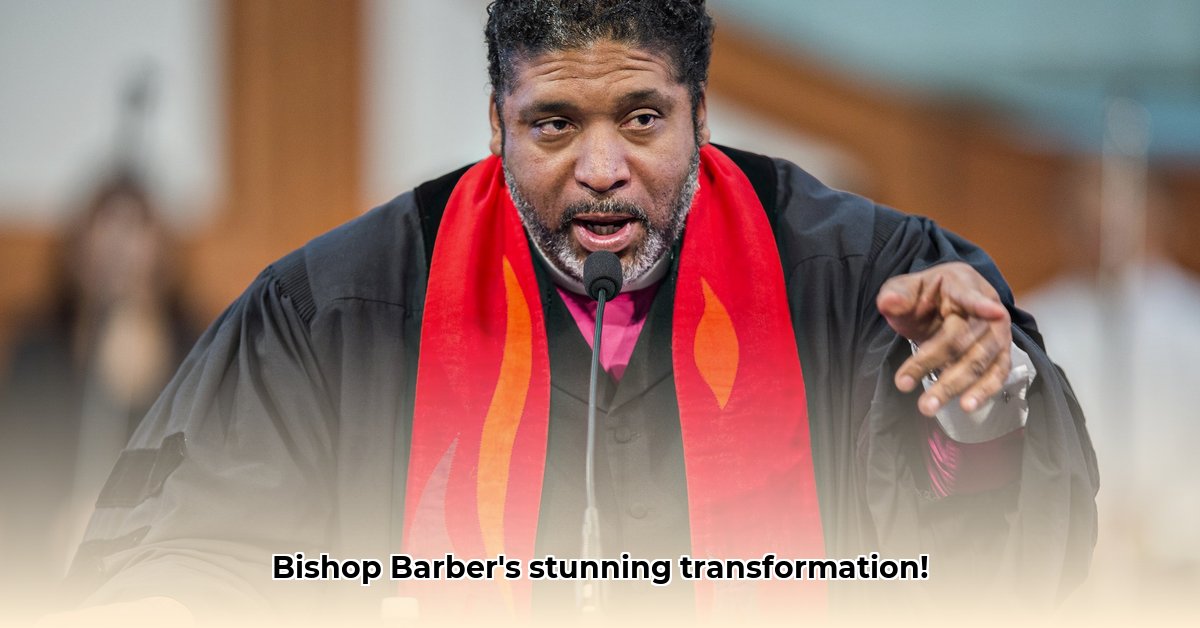
A Transformation Fueled by Faith and Fierce Advocacy
Rev. William Barber II, a prominent figure in the American social justice movement, recently achieved a remarkable personal transformation: a significant weight loss of approximately 150 pounds. This wasn't simply a matter of aesthetics; it represents a powerful testament to resilience and a compelling illustration of how personal well-being can profoundly fuel impactful social activism. His journey underscores a vital connection between self-care and the sustained, effective pursuit of justice. For more on his journey, see Rev. Barber's Transformation.
Carrying the Weight of the World, and His Own
Rev. Barber's unwavering commitment to social and economic justice is legendary. He's renowned for his impassioned speeches, steadfast dedication, and extraordinary ability to mobilize widespread support. But even the most steadfast leaders bear the immense burdens of their work. The relentless demands of his activism, the emotional toll of fighting for equality, and the sheer physical exertion of organizing large-scale movements likely contributed to his previous weight. His substantial weight loss suggests a conscious decision to address both the visible and often unseen consequences of his dedication. Is it any wonder that those committed to fighting injustice might also experience the weight of the world pressing down on them?
A Journey of Self-Care: More Than Just a Diet
While the specifics of Rev. Barber's weight loss strategy remain private, it clearly involved more than a simple diet. It most likely encompassed a holistic approach, a deliberate decision to nourish his mind, body, and spirit. Imagine the dedication required: balancing the unwavering demands of his activism with the discipline of prioritizing healthier choices. It suggests a gradual lifestyle shift, likely incorporating regular exercise and mindful eating. This wasn't a rapid fix, but a sustained commitment to self-care, demonstrating a deep respect for his own well-being. How many of us strive for such a balance between our passions and our personal needs?
A Symbol of Renewed Strength and Energy
Rev. Barber's transformation carries profound symbolic weight. The pounds lost didn't simply represent a reduction in physical size; they symbolized the burdens—both physical and emotional—that might have previously hindered his ability to fully dedicate himself to his activism. His newfound energy and improved mobility likely allowed him to sustain longer work hours and maintain his rigorous schedule. The ability to stand longer during speeches, to walk further during demonstrations, to engage more effectively with constituents – these are all direct benefits of his improved health. His already powerful activism was amplified by his revitalized physical state. This transformation serves as a potent reminder that caring for our physical selves directly impacts our ability to care for others.
Inspiration and Shared Experiences
Rev. Barber's journey resonates deeply with many activists, community organizers, and individuals engaged in demanding work. The pursuit of social justice, while deeply fulfilling, often exacts a substantial physical and emotional toll. Many dedicated individuals prioritize their cause over their personal well-being. Rev. Barber's experience reminds us that prioritizing self-care isn't selfish; it's essential. It's about sustaining the very engine of change, ensuring that those fighting for a better world possess the strength and resilience to continue the fight. Their dedication should not come at the expense of their own well-being.
Practical Steps Towards Well-being and Advocacy
Rev. Barber's journey doesn't offer a specific weight loss plan; it emphasizes the importance of holistic well-being. It’s about finding what works for you, integrating self-care into your routine not as an afterthought but as a vital component of your work. Consider these steps:
Prioritize Self-Care: Integrate regular physical activity, mindful eating, and stress-reduction techniques (like meditation or yoga) into your daily routine. Even small, consistent actions yield significant results.
Foster Strong Support Networks: Surround yourself with individuals who understand and support your work. Share your burdens and celebrate your victories together. Community and connection are vital for well-being.
Find Your Balance: Learn to pace yourself. Sustained efforts are more impactful than short bursts of intense activity. Schedule time for rest, hobbies, and social interactions to prevent burnout.
Seek Professional Guidance: Don’t hesitate to consult healthcare professionals and mental health experts. They offer personalized advice and support tailored to your unique needs.
A Lasting Legacy of Resilience
Rev. Barber's weight loss journey carries a powerful message far exceeding his personal experience. It highlights the profound connection between personal well-being and the pursuit of social change. His story is a testament to resilience, demonstrating that self-care is not a luxury, but a necessity for those dedicated to creating a better world. His transformation inspires us to prioritize our own health and well-being so we, too, can continue the fight for justice with renewed energy and unwavering determination.